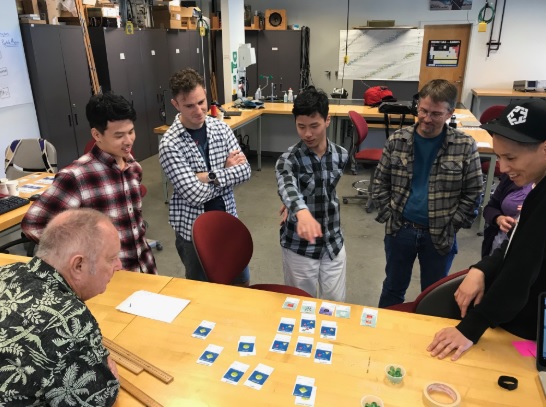Friday Flyer - March 8, 2019

Spotlight on the University of Washington QuarkNet Center
This center, based at the University of Washington's campus in Seattle, is led by mentors Shih-Chieh Hsu and Michael Park. In March of 2018, this center hosted a CMS masterclass, attended by 18 students and two teachers from area high schools. An added treat for those who attended the masterclass was a tour of UW's Center for Experimental Nuclear Physics and Astrophysics (CENPA). In August of 2018, teachers met on campus for a three-day meeting. During this time, they worked through and reflected on several activities from the Data Activities Portfolio and analyzed ATLAS data as part of an ATLAS data workshop. The teachers were able to connect with ATLAS physicist Steven Goldfarb at CERN for a virtual tour. With the help of Cosmic fellow Rose Emanuel and the mentors, the group was also able to set up a cosmic ray detector and learn a bit about the inner workings of the detector. In addition, UW Professor Emeritus Jeff Wilkes gave a talk on cosmic ray experiments throughout history, from the discovery of cosmic rays in the early 20th century through experiments that are taking place today.


News from QuarkNet Central
We've just learned that the IPPOG Girls Do Physics Instagram campaign has extended their deadline to March 13. Find out more at this Girls Do Physics website. Go for it now, before that deadline extension decays into photons!
International Masterclasses (IMC) 2019 officially started this week! Learn how to communicate your masterclass experiences on social media and find out who will be moderating this year's videoconferences on the latest IMC circular just released today. You can also access the archive of IMC circulars to browse through all of this year's circulars.
International Muon Week is coming up April 1-5. Student groups around the world will use their cosmic ray detectors to detect muons and, in their Speed Study, measure the average time it takes muons to traverse the measured distance between two scintillation counters. An international map will show participants and their results. Students can also participate in videoconferences during the following week to discuss their results. Teachers and mentors: Please register!
One more reminder: The 2019 Beamline for Schools (BL4S) competition at CERN is accepting proposals through March 31.

Physics Experiment Roundup
Ars Technica's John Timmer talks with the operations manager of the IceCube neutrino experiment about the challenges of working with a detector buried deep in the Antarctic ice. Learn about FASER, the tiny new experiment at the LHC that will look for long-lived, exotic particles. Find out about the PIP-II project, the planned upgrade at Fermilab's particle accelerator complex that will drive Fermilab research into the future.

Resources
Interested in taking a walk around the Large Hadron Collider from the comfort of your own home? Well, you're in luck! Check out Google's new Street View-powered tour of the LHC, along with a larger collection allowing you to explore other parts of CERN as well. The collaboration between Google and CERN has also produced the augmented reality app Big Bang, which explores the early universe.
From Phys.org, learn how the LHC is pushing computing to the limits. And from MinutePhysics: Shells of Cosmic Time.

Just for Fun
April Fools' Day will be here before you know it. Mechanical engineer Mark Rober shares some pranks he designed that can be made with junk lying around the house!
QuarkNet Staff:
Mark Adams: adams@fnal.gov
Ken Cecire: kcecire@nd.edu
Shane Wood: swood5@nd.edu
